Covid-19: Australia ‘talks softly and carries a big vaccine’ in Pacific
It’s Australia’s other Covid-19 vaccine rollout – and the one in the Pacific isn’t going too badly. Beijing is not impressed.
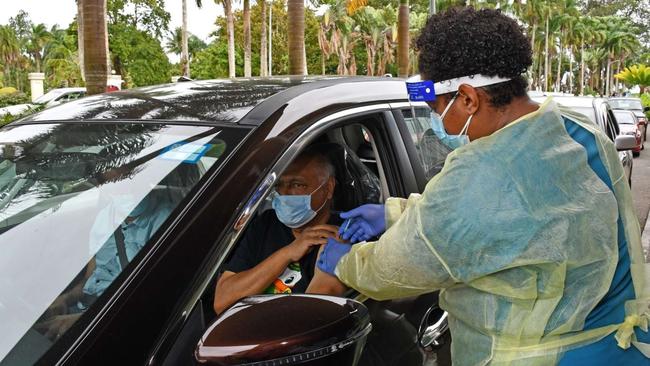
It’s Australia’s other vaccine rollout – and this one’s not going too badly.
On Friday, a third plane in two days will fly from Australia to the Pacific carrying lifesaving doses of the Melbourne-produced AstraZeneca Covid-19 vaccine.
Its cargo follows two flights on Thursday carrying 70,000 doses to Fiji and 40,000 doses to Timor-Leste.
Those 120,000 doses are the first since the Morrison government’s decision to send up to 15 million vaccines to its near neighbourhood before mid-2022.
“Supporting our neighbours through this pandemic is a moral and economic responsibility,” says Zed Seselja, Australia’s Minister for International Development and the Pacific.
Jane Halton, co-chair of the global vaccine fairness initiative COVAX, calls it a “game-changer” for the region.
It’s the silver lining of the decision to reduce the amount of AstraZeneca in Australia’s domestic rollout.
Some of the same actors undermining Australia’s domestic rollout – including the Queensland state government – are complicating what could be one of the country’s greatest aid efforts.
Claims by some Pacific churches that vaccines are “the work of Satan” are another problem.
Looming over it all is a high stakes battle for influence with China.
“The quantum from Australia is clearly influenced by them keeping an eye on the Chinese,” says Colin Tukuitonga, associate dean of the Pacific at Auckland University’s medical school.
Not that Professor Tukuitonga – who until late 2019 ran the region’s key scientific and technical organisation, Pacific Community – thinks the Morrison government’s commitment will entirely sideline Beijing.
“My suspicion is that regardless of that, some islands will continue to roll out the Chinese vaccines,” he says. “There are bigger issues at play here.”
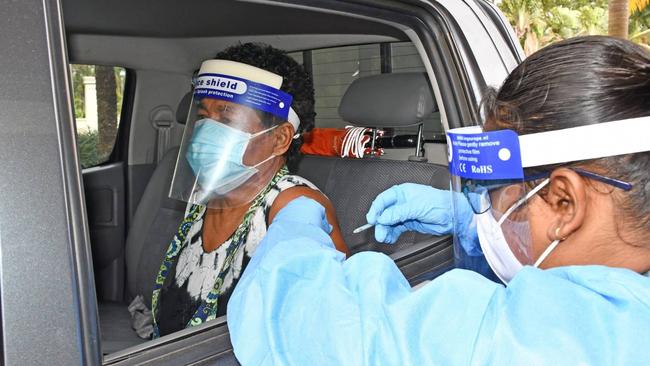
“I have not been magnetised”
The speed of the rollout in Fiji is amazing by Australian standards. Almost 60 per cent of Fiji’s adult population – more than 330,000 people and rising – have had their first jab. Almost 10 per cent are fully vaccinated.
Along with the vaccines, Australian and New Zealand medical officers are on the ground helping Fijians in what is ground zero of the Pacific’s battles with a once-in-a-100-years pandemic.
Dan McGarry, an independent journalist based in Vanuatu, characterises Australia’s assistance as “talk softly and carry a big vaccine”.
That low-key approach is partly out of respect for a region whose leaders act with humility.
It is also out of respect for less internationally minded pockets of the Australian electorate.
The challenges are tremendous. On Wednesday, Fiji recorded 791 new cases of Covid-19. Another three deaths took the country’s official total to 39.
Misinformation has become a huge problem.
Fijian Prime Minister Frank Bainimarama addressed some of the theories swirling around the country in an extraordinary address on Thursday.
“I can tell you I have not been magnetised or microchipped by the vaccine,” he said.
“I have not received the mark of the beast, or any other creature.”
For all those challenges, Fiji’s vaccination drive demonstrates the heft of Australia’s AstraZeneca supply in the Pacific.
The weekly production at CSL’s Melbourne factory of about one million doses goes a long way in a region with a total adult-age population of about nine million.
Australia’s new commitment this week could shave 18 months off the rollout timeline for the tourism-dependent region.
McGarry, a Canadian citizen who used to edit Vanuatu’s Daily Post, says the Morrison government’s decision is the most consequential decision for the region since the pandemic started.
“There’s nothing bigger,” he says.
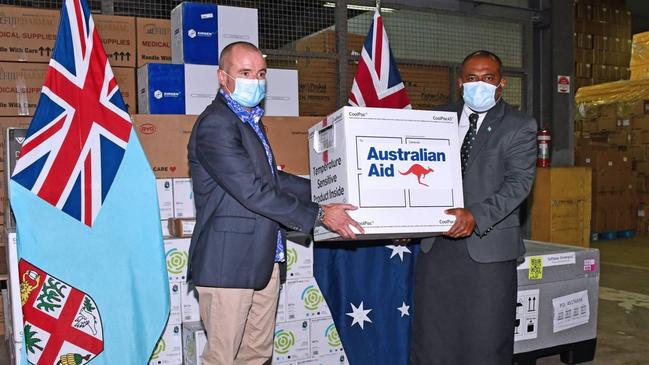
Beijing is not impressed
China’s foreign ministry this week timed a tantrum for Senator Seselja’s visit to Papua New Guinea.
Foreign ministry spokesman Wang Wenbin accused Australia of undermining the health of PNG’s 8.5 million people.
“Those in Australia who take advantage of vaccine issues to engage in political manipulation and bullying coercion are being callous to the life and health of the people in PNG,” Mr Wang said in a tirade remarkable even by the hardball standards of the Xi Jinping-era.
Those comments followed a story by the state-controlled Global Times that claimed Australia had “planted” consultants in PNG’s health system to delay approval of the Chinese-made Sinopharm vaccine.
China’s new envoy, Zeng Fanhua, had his photo taken as he received the Sinopharm doses at Port Moresby’s Jacksons International Airport with PNG Planning Minister Rainbo Paita.
Two weeks later, only Chinese nationals working in the country are allowed to be injected with it.
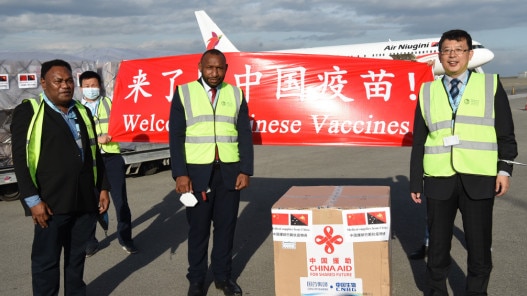
“Australia has been racking its brain to undermine China’s vaccine co-operation with Pacific Island countries,” the Global Times reported.
Beijing’s foreign ministry spokesman Wang was still grumbling by the end of the week.
On Thursday evening he repeated that the Global Times report – denied by the Morrison government – revealed how Australia had “obstructed and sabotaged” China’s vaccine help.
“Compared to denying it all, it would be much better if the Australian side can state publicly that it welcomes China’s vaccine co-operation with Pacific island countries,” said Wang from his Beijing podium.
Jonathan Pryke, the director of the Lowy Institute’s Pacific Islands Program, says China has been “largely absent” during the region’s most profound health crisis.
“Where’s the financial support? Where’s the broader support for the health systems? They’ve provided some PPE and vaccines, but it’s really been piecemeal and tokenistic,” Pryke tells The Australian.
“They’ve found themselves on the backfoot and now they are trying to fight their way out of it through smearing.”
“Shooting ourselves in the foot”
Supply is not the problem right now in PNG.
Tens of thousands of AstraZeneca doses are soon to expire, such is the hesitancy among a population that has never had an adult vaccination program.
PNG Health Minister Jelta Wong has singled out Facebook as his country’s “biggest conspiracy theorists platform” and one of its chief obstacles to vaccination.
Queensland rugby league legend Mal Meninga has been enlisted to increase trust.
Other voices in Australia – including Queensland’s state government – have been less helpful.
Premier Annastacia Palaszczuk’s warning last week about the use of AstraZeneca on Australians under 40 ricocheted around PNG and the wider Pacific.
Mr Pryke – who is based in Sydney and received his first AstraZeneca jab on Wednesday – says Australians, particularly political leaders, needed to be aware that their words travelled.
“We’re shooting ourselves in the foot here,” he says.
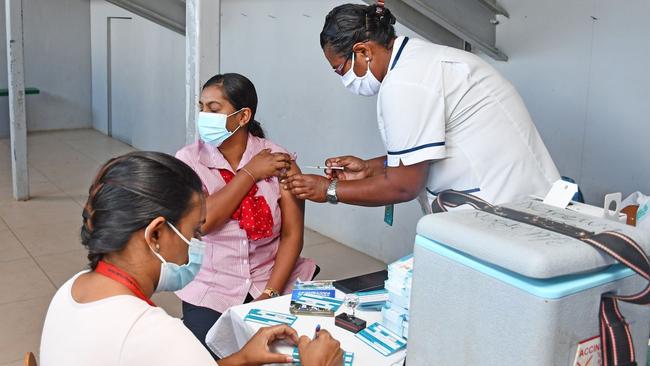
Back up from Biden?
Vanuatu on Friday will join the Solomon Islands and Timor-Leste in adding a Chinese vaccine to its rollout.
Prime Minister Bob Loughman was the first to get the Sinopharm vaccine – and smile for the Chinese embassy cameras – after the first doses arrived three weeks ago in Port Vila.
Yet even in the three countries that have allowed Chinese vaccines, the majority of jabs in Pacific arms have been donated by the COVAX program to which China hasn’t contributed at all.
Graeme Smith, an expert on China in the Pacific, says Beijing’s approach is often “more about the photo op”.
“There’s a huge gap between the reality of Chinese support and the public perception,” says Dr Smith, a fellow at the Australian National University.
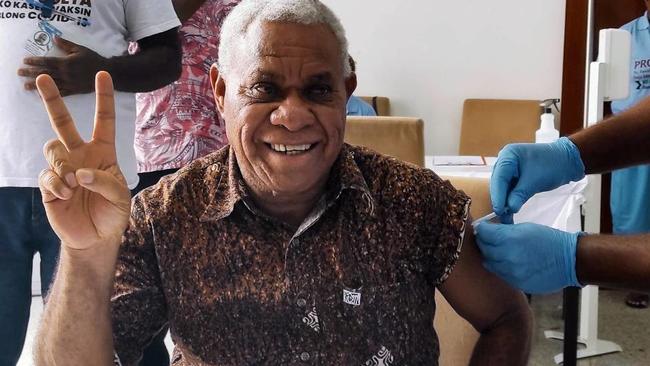
Fiji has the best health network in the Pacific, allowing it to speed up its vaccine distribution rate as Australia has ramped up supplies.
Timor is also jabbing at an impressive rate.
And some of the Pacific’s micro-states are almost entirely vaccinated, including Nauru, Palau and the Marshall Islands — three countries which, as it happens, all recognise Taiwan instead of the People’s Republic of China.
Nauru’s easy-to-reach population was covered by COVAX-supplied AstraZeneca. The US donated its Moderna vaccine to take care of Palau and the Marshall Islands.
New Zealand has also rolled out Pfizer doses across the Cooks Islands and Niue.
The outlook is much trickier in the far flung corners of the Solomons, Vanuatu and — most difficult of all — the provinces of PNG.
Senator Seselja says Australia’s help goes far beyond the delivery of vaccines.
“We are working with our partners across the region to strengthen their response and recovery from the pandemic, including through logistics, communications, training, testing, economic and technical support as needed,” he says.
As the rollout gets into the Pacific’s most remote terrain, that Australian assistance could involve a request from its security ally. The single-dose American-made Johnson & Johnson vaccine looks ideal for the Pacific’s hardest to reach areas.
“You can have a team with a chiller bag and they go from island to island – and they don’t need to worry about going back again,” says Professor Tukuitonga.
The geopolitics are also promising.
US President Joe Biden’s top Asia adviser Kurt Campbell this week said the US was planning several “major initiatives” involving Pacific island nations.
It could be just the thing to complement the Morrison government’s latest Pacific step-up.





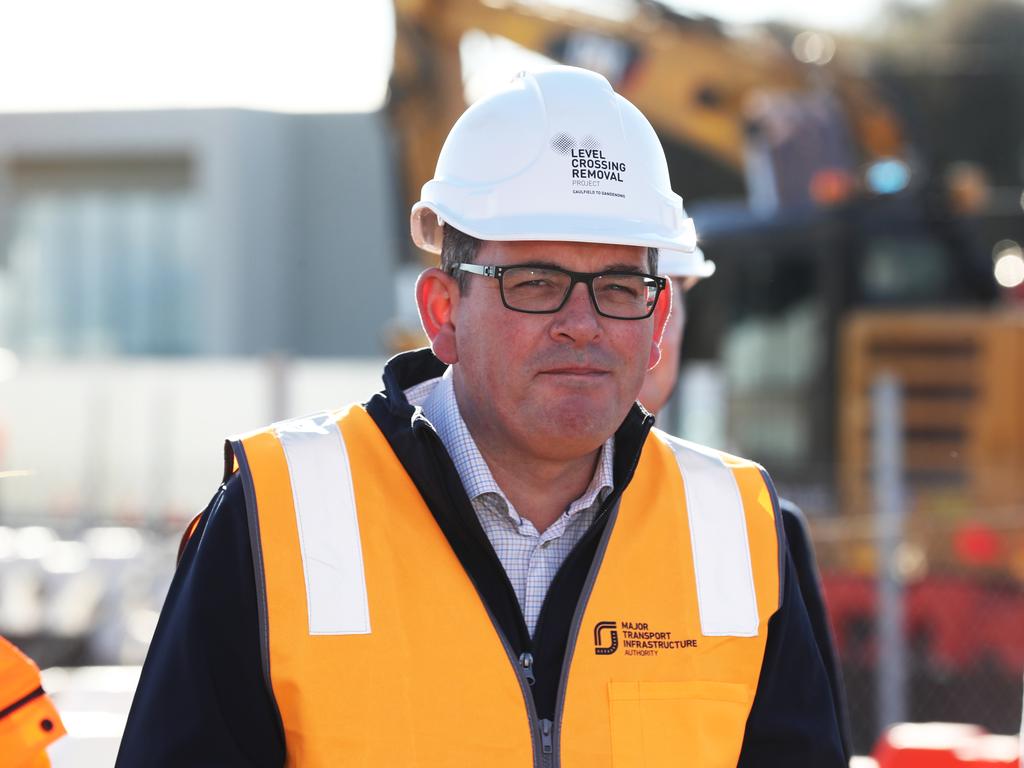


To join the conversation, please log in. Don't have an account? Register
Join the conversation, you are commenting as Logout